#anti the mortal instruments city of bones movie
Explore tagged Tumblr posts
Text
I think I would actually like movie and book Alec if he bothered to tell Clary the Clave would derune or kill him if anyone knew he was in love with his parabatai but that would require Cassandra Clare to actually write decently
24 notes
·
View notes
Text
Any good tsc adaptation would need horror
It’s not just set dressing but a feature
(It’s been ages since I’ve seen the CoB movie but from what I remember I do appreciate what they did there, at least with some of the demons)
Looking back on my time with this series I realise I always enjoyed these elements a lot; they were part of the reason it fascinated me so much. Because a lot of ya lit at the time was supernatural and featured ‘creatures of the night’ but mostly didn’t really deliver on the premise. Meanwhile, I was obsessed with the chills I got from TMI when I was 12, and never succeeded in resurrecting that feeling until I started reading actual horror lit as an adult.
Some personal highlights were:
- The disgusting demons in TMI (some of my core memories are the Abbadon fight in CoB and the Raum demons in CoA)
- Agramon & the massacre in the silent city
- The clockwork creatures in TID
- Overall the way the fae are portrayed, some of the descriptions in CoA still haunt me
- Lilith’s snake eyes aah I loved it
- Malcolm with his silly little Hands of Glory, also later on: the state his resurrected corpse was in, so disturbing, amazing, 10/10
- The Belial possesion scene in ChoT
#this post just reminds me of how much i fucking love city of ashes#the last hours#the shadowhunter chronicles#the dark artifacts#the infernal devices#the mortal instruments#city of ashes#anti shadowhunters#city of bones movie
61 notes
·
View notes
Text
Hey, if you’re ever in need of a bad movie to watch...
You should watch The Mortal Instruments: City of Bones
Yeah.
This bitch.
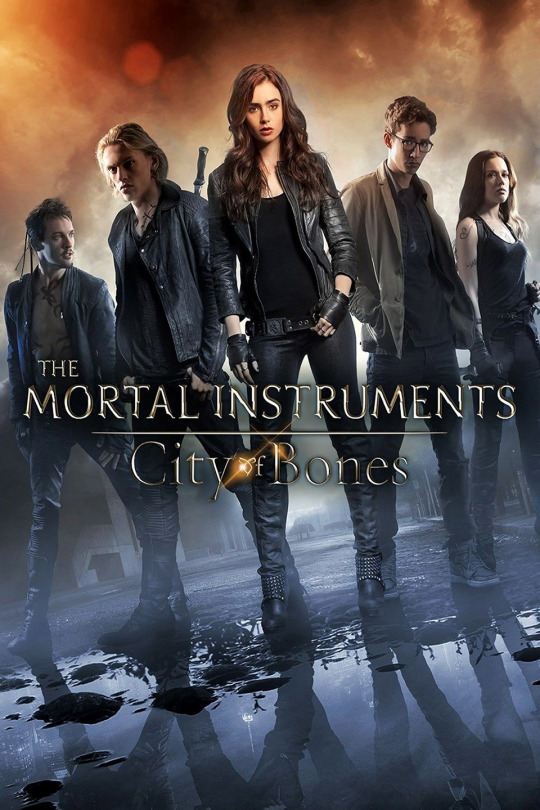
It’s absolutely terrible. You will hate it, and not in the fun way. You’ll watch the entire thing shaking with rage, and it will be horrid. You’ll despise it. Then you’ll finish and go try to figure out:
What the hell was that about?
Watch TMI: City of Bones. You will regret it.
#the mortal instruments#city of bones#cassandra clare#misc#movie reviews#i just finished this and i hated it!! so im here mocking it on the internet. yay!#anti tmi#tmi:cob
13 notes
·
View notes
Text
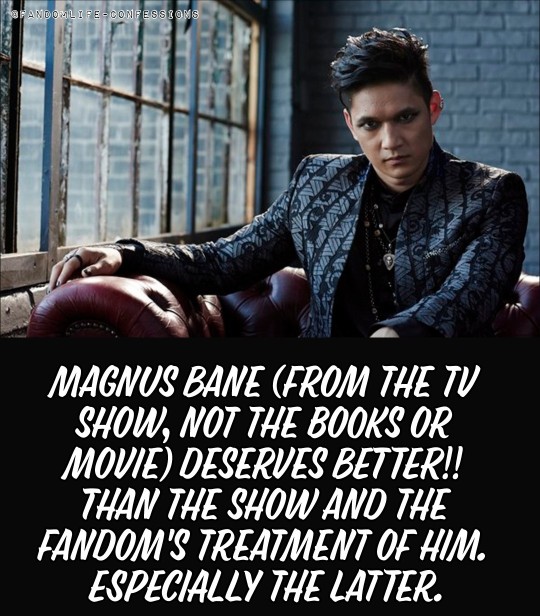
#magnus bane#Anti magnus bane (book)#Anti magnus bane (movie)#Shadowhunters#Shadowhunters: The Mortal Instruments#Anti The Mortal Instruments#The Mortal Instruments#Anti The Mortal Instruments: City of Bones#The Mortal Instruments: City of Bones#fandomlife confessions
12 notes
·
View notes
Text
Nothing but respect for MY Jace Herondale who is played by an unproblematic beautiful talented angel.

#the better man the right man#dom sherwood#dominic sherwood#drama#shadowhunters#tmi#the mortal instruments#city of bones#tmi movie#jace herondale#jace wayland#jonathan herondale#jamie campbell bower#jamie bower#anti dom sherwood#lgbtq#homophobia#recastjace#movie!jace#dom is over party#shitty apologies#freeform
2K notes
·
View notes
Text
You know what I loved best about Shadowhunters?
It is the first time I’ve seen anyone tackle the idea of a deconstructive adaptation outside of fanfiction.
The Mortal Instruments novels were pretty popular as I recall. They sold well, built up a pretty passionate fanbase, and even got a movie that I never actually saw. I think I read maybe the first one, and it wasn’t really to my taste, but I didn’t think it was terrible. It just had a lot of the common flaws that I see in a lot of YA books.
And generally, when you get an adaptation, it doesn’t tend to touch on these problematic elements. Or if it does, it kind of sidles away from them. The Twilight movies, for example, show us a couple of POC as vampires, even though technically according to the books, all vampires get paler with age. But at the same time, neither movies nor books really address the inherent racist dynamic between the vampires and the werewolves. And so on.
Shadowhunters is different.
When I watch Shadowhunters as an adaptation, I get the sense that a lot of the people involved genuinely do love the Mortal Instruments as a series, but that they’re not willing to overlook the problematic elements. They want to explore them instead.
And they did. Starting with the Clave. Because, at least from what I recall, there’s not a whole lot TO the Clave in the books. I mean, it’s there. Sort of. But our main trio (Jace, Alec, and Izzy) seem to be primarily fighting demons on their own. They’re literally children. I think Alec is the oldest at what, seventeen? And while they’re meant to protect Downworlders and only kill demons, there’s a certain level of probably unconscious superiority. I mean obviously they don’t support Valentine, the villain who wants to genocide all the downworlders. But the elements are still there. Our heroes have angel blood, our heroes are special, and their authority is righteous.
I’m not trying to attack Ms. Clare with this, because I think this kind of thing is very very common in YA books in general. But I love what Shadowhunters did with this set up.
First, Shadowhunters did away with the idea of Jace, Alec, and Izzy as lone child soldiers against demons. The Clave exists, and it’s very visible. The Institute is bustling, filled with all sorts of background personnel. Something is always happening. Things are always being monitored. There are missions happening that our characters aren’t necessarily involved in. This does create a bit of narrative awkwardness in the first season, when the show tended to cleave more loyally to the books. (Alec’s role as de facto leader of the Institute early on in particular seems to wax and wane in terms of level of authority.). But it smooths itself out early on. And it makes more sense: fighting demons is pretty important. Not a matter to be left to three teenagers alone.
The show both ages up our characters, which makes certain romantic plots a lot less creepy, and actually addresses the idea that these people have been essentially soldiers from childhood, and that there is a LOT of institutionalized racism and superiority, along with militant duty, that gets drilled into these people from birth. We get to see the kind of environment that builds a Valentine, and how even generally rational adults like Luke and Jocelyn might have gotten caught up in his fanatic ideology. It takes the throwaway comments and superiority displayed by the protagonists in the book and extrapolates where that came from.
I remember reading somewhere that Ms. Clare was really unhappy with Alec’s actions early on in season one, when he was in support of Meliorn being taken to the City of Bones for interrogation (torture). And I can understand that. I’m sure Ms. Clare has a very clear idea in her mind about who Alexander Lightwood is. And her Alec Lightwood would never agree to take a man to be tortured.
But I think that, in terms of the show, it was important to show Alec like that. Because we needed to see exactly how ingrained this ideology actually is. Jace is the brooding rebel. Izzy is the bleeding heart half in love with Meliorn already. Alec is the responsible one, the dutiful one who shoulders the burdens. Which means, he’s the character most likely (at this point in the story) to swallow his conscience and misgivings and do what he thinks he’s supposed to do.
It’s an ugly moment, but it provides us with a focal point for his eventual growth. Alec’s multi-season plot, of overcoming both overt and unconscious personal racism, to tackling the problems of the Clave itself, is one of my favorite parts of the series. And it had to start somewhere.
One of the touches that initially made me uncomfortable, but now I rather like, is how most of the Shadowhunters are white, while most of the Downworlders are POC. There are exceptions on both sides (the Penhallows, Luke-pre-Werewolfing, Iris Rouse), but that’s the general gist. And at first, I thought this was a really bad thing. Until I realized that the show actually was making a point.
Because the racism against Downworlders is fantastic racism. And all too often, fantastic racism becomes an excuse to use real world narrative tropes meant for poc and apply them to white people. And look, I like X-Men as much as anyone, but this isn’t our story. (And there are very few things that annoy me more than when we see fantasy racism applied in ways that lead to POC being racist against white people: see the anti-alien senator during one season of Supergirl who just happened to be Latina.)
Even though it’s still a little uncomfortable that most of the people with “angel blood” are white and most of the people with “demon blood” are not, it does mean that we’re basically returning the focus of the fantastic racism back where it should be: on the POC victims.
Most of the Downworlders we see on the show are good people. They’re trying to live their lives the best they can. And the Clave uses the actions of a few bad apples (many of whom have some significant provocation!) to justify a draconian rule over all of them.
The parallels are hard to miss, and the show doesn’t actually try to miss them. I always think particularly of the episode in season 2, where the Clave starts to chip Downworlders in response to a serial killer targeting Shadowhunters. It’s heavy handed, sure, but it hits hard when Maia talks about real world racism and how the Shadowhunters are supposed to be better than that. It’s another episode where a main character is complicit in the institutional racism, and that gets called out too.
It’s not perfect, of course. And I think Jace, in particular, ends up getting off scott free for things that he really shouldn’t. (For example, kidnapping the werewolf girl and bringing her to Valentine makes him literally guilty of her murder under the law.) But it’s something.
Another improvement from the books is in Alec and Magnus’s relationship. For one thing, they’re a side couple in the books, given a handful of scenes here and there, but very much in the shadow of Clary and Jace’s drama. Their plots have some seriously uncomfortable elements: the age difference, the way Magnus presses Alec to come out, Alec’s paranoia over Magnus’s sexuality and past experience, Alec’s plotting with Camille to remove Magnus’s immortality. It’s a mess.
Now whether or not it’s a worse mess than Clary and Jace’s nonsense. You got me. But it wasn’t fun.
But even with the problems, Magnus and Alec meant something to a lot of fans. And I think the show really delivers on that front. Magnus and Alec go from being a side couple with a handful of scenes, to in many ways, being the pillar of the series. The age difference is less of an issue (I mean, Magnus is still many times Alec’s age, but Alec is actually an adult in this version). The biphobia is gone, and while Alec is occasionally intimidated by the difference in their experiences, it never turns into a critique of Magnus.
Their conflicts and obstacles are much more compelling. Alec’s initial coming out story was triumphant and the best part of season 1 to me. The fact that Magnus is a Downworlder, and Alec is a Shadowhunter, with all that entails isn’t forgotten. The romance, and Alec’s plot of overcoming his racism, are deeply intertwined. And Magnus isn’t a bit part in the story either. His plot, especially with regard to his self-identity and relationship to his magic, is just as important, if not more so, by the last season.
The weakest part of the series for me was when they were more faithful to the books, but I thought the show did a good job of refocusing later season events on Clary rather than Jace. One of the things that annoyed me about book and the early part of the series is that, as soon as we had Jace’s (not) parentage reveal, he seemed to end up with 90% of the focus in any of the family drama. Clary discovers her long lost father is a genocidal maniac, but Jace was raised by the man so it gets more focus. The dynamic between Jace and Jonathan had a lot more focus in the books too. Sometimes it seemed like the story forgot that Clary also had a family stake in more than just her mother. So I was really happy when the show started digging into Clary’s identity as a Morgenstern, and went the route of linking her to Jonathan. (Even if I could definitely do without incestuous overtones.) Jace, as a character, tends to work better when he isn’t the center focus, in my opinion. Or at least when the focus is shared, and he gets to react and take part in other characters’ plotlines.
You’ll occasionally see this sort of deconstruction in fanfiction (when it’s not a joyous celebration of unlikely characters banging - not that there’s anything wrong with that), but rarely to this extent, and certainly never with this kind of budget. The idea of a “Shadowhunters style deconstruction” is a really interesting thought exercise to apply to all sorts of media that has both enjoyable and problematic elements.
44 notes
·
View notes
Text
I was rewatching The Mortal Instruments: City of Bones movie and I’ve always been disturbed by the lack of parabatai mention but they managed to put multiple (like 3) deflect runes on Jace but they couldn’t just slap on a parabatai rune??
#anti tmi movie#the movie irks me#parabatai#the mortal instruments: city of bones#tmi movie#sigh#jamie campbell bower#kevin zegers#jalec#movie jalec
12 notes
·
View notes
Text
Sydney Morning Herald: Lily Collins on outshining dad Phil and her new blockbuster role
Lily Collins is in a good place right now, the best place, perhaps, in her quietly glittering career. The British-American actor, 29, has the sort of resumé – movie star, fashion icon, proper published author – that might make her an object of envy were she not so grounded, so very relatable. But it's her forthcoming, wildly praised role as Fantine, that oh-so-tragic young factory worker, in a six-part BBC adaptation of Victor Hugo's famed 1862 novel, Les Misérables, that looks set to send her stratospheric.
"It's a role I've been preparing for all my life," says Lily, hazel eyes dancing under big, beautiful brows. "I mean, I read the book at school" – that's Harvard-Westlake School in Los Angeles – "but if I had known I was going to play Fantine one day, I would definitely have paid more attention!"
“It’s the things that make you different that end up making you unique.”
She gives a smile. "Fantine drives the story at the beginning and her essence and memory continue throughout the series. To me she represents everlasting hope in times of darkness, no matter what the time period."
There have been several versions of Les Misérables, of course, the most famous being the musical that is still playing on Broadway and in London's West End, and the similarly sung-through 2012 movie starring Hugh Jackman and Russell Crowe, with Anne Hathaway as Fantine.
A sweet-natured grisette (young, working-class Frenchwoman), Fantine's seduction by an older student, the charming cad Felix (Johnny Flynn in the BBC series), results in her falling pregnant and struggling to survive as a single mother. Conned by her child's carers, destitute and desperate, she falls on hard times. Fantine is an iconic character, and one that miniseries director Tom Shankland encouraged Lily to make her own.
"Tom told me to forget every other Les Mis I'd seen and just go back to the writing," says Lily of this song-free version, scripted by Andrew Davies (who wrote the US version of House of Cards) and is delivered in plain-spoken, vowel-dropped English despite the epic backdrop of 19th-century France (or Belgium masquerading as France) at a time of civil unrest.
"We were encouraged to bring a fresh take, to breathe life into a song lyric and make it an episode," she continues in her soft American twang. "Not everybody loves musicals. So where Fantine has a line in one of her songs that mentions her falling in love, now we get to see how it happened."
Lily is here at BAFTA (British Academy of Film and Television Arts) in central London for the premiere of Les Misérables, the cast of which includes David Oyelowo, Dominic West and Olivia Colman. It's raining outside, but Lily – standing reed-slim in an ultra-tight sparkling minidress ("It's going to be tricky for me to sit down") – oozes the sunniness of California, where she has been based since the age of five, having moved there from England following her parents' divorce. The daughter of former Genesis drummer (and later singer) Phil Collins and his American second wife, Jill Tavelman, Lily might easily have fast-tracked her ascent by trading on her surname.
She hasn't, which makes her success all the sweeter. "I am super proud of my dad," she has said of her hit-maker father, who has five children by his three ex-wives (and who recently toured Australia). "But I wanted to do it on my own. People assume it's easier when you have that name but if you're the kind of person who doesn't want to use it, it's a lot harder."
Nevertheless, from her first on-screen appearance, aged two, in a BBC series called Growing Pains, Lily's rise seems to have been remarkably smooth. Performing is in her blood, after all: as a young girl she'd watch old Hollywood films, many featuring her maternal grandmother Jane Hale, a ballerina and actress, then dress up to mimic her favourite characters.
She attended the Youth Academy of Dramatic Arts in Los Angeles, taking part in musical theatre productions. She was also a teen columnist for UK magazine Elle Girl, and a socialite whose alabaster beauty caught the eye of Chanel, which dressed her in a gown for a debutante ball that featured in the reality TV show The Hills.
By 2008, Lily was in demand as a model and brand ambassador (she is currently the face of French beauty brand Lancôme) and making a name as a red-carpet correspondent and children's TV presenter. A year later, she featured as a minor character in the American teen drama series 90210 and made her film debut as Sandra Bullock's daughter in the Oscar-nominated The Blind Side.
The scripts started tumbling in, and Lily dropped out of studying broadcast journalism to take supporting roles in an action film and a thriller. In 2012, she starred in Mirror Mirror as a sword-wielding Snow White opposite Julia Roberts' evil queen.
"So Fantine is not the first time I've played a literary character with opinions," grins Lily, who lobbied for a second audition for Snow White after being unhappy with her first try-out, duly clinching the part.
"I wanted to do it on my own. People assume it's easier when you have that name but if you're the kind of person who doesn't want to use it, it's a lot harder."
There's also been sci-fi (The Mortal Instruments: City of Bones), throwback romantic-comedy drama (Warren Beatty's Rules Don't Apply, which got her a Golden Globe nomination), and the CGI-enhanced Okja, in which she played a young animal activist intent on saving her best (four-legged) friend.
And there was a lead role in the controversial anorexia drama To the Bone. It divided critics but Lily has insisted that it helped her understand her own teenage battle with eating disorders, which she detailed in her 2017 memoir, Unfiltered: No Shame, No Regrets, Just Me.
"It's very rare you get the opportunity to wear shoes you once wore with a different perspective on things," she told Vanity Fair. "This was an amazing opportunity to gain knowledge, and helped me let go a lot."
As did the writing of Unfiltered. Divulging personal information in print is one thing. Doing so when you have a famous dad and 13 million Instagram followers is another. Lily – who wrote every word herself – says she found the process liberating.
"I decided to write the book because I kept reading what people were posting on social media and thinking, 'You're so brave,' " she says. "It was a really difficult thing for me to do, but the feedback I got made it way more rewarding than I expected."
Boyfriends' names were changed in an essay on dating (if rumoured exes Zac Efron and Chris Evans are in there, she's not saying). Silliness is praised as attractive; those eyebrows, which she plucked to thin lines at school, are reclaimed and championed in all their bushy glory. And in an open letter to her father, Lily tells the 67-year-old that she "forgives" him for "not being the dad I expected", and notes the impact that her parents' famously messy divorce had on her teenage years: "I accept and honour the sadness and anger I felt towards the things you did or didn't do," she writes.
Today she'd prefer not to discuss specifics, though offers You'll Be in My Heart from the 1999 Disney animated film Tarzan when asked to choose her favourite Phil Collins song: "He wrote it as a lullaby to me as a kid," she says, re-routing the conversation to Unfiltered and the main reason she set fingers to laptop: to make young people feel less alone. The sentiment dovetails with Lily's advocacy work for charities including Bystander Revolution, an anti-bullying organisation, and the GO Campaign, which raises funds for orphans and vulnerable children.
"Open communication with teenagers is something I'm very passionate about," she says. "Speaking about insecurities and being honest about what you are going through is vital. One young woman asked me, 'But what if you know you're born different, if your quirks and interests aren't the norm? When you're a green apple when everyone else is a red one?'
"I said, 'Well, I've always loved green apples! It's the things that make you different that end up making you unique.' " She pauses for a beat. "So many kids have these deep, thoughtful questions. It doesn't matter what political, religious, sexual-orientation background you come from, we all go through the same insecurities and realising this fact is the beauty of communications."
"It's very rare you get the opportunity to wear shoes you once wore with a different perspective on things"
Additionally, by setting her own example – by putting it all out there in Unfiltered – Lily was able to let go of personal baggage, which in turn allowed her to go deeper into her characters. Forthcoming appearances include two extremes: Edith Bratt, beloved wife and muse of English writer J.R.R. Tolkien, author of The Lord of the Rings, in the biopic Tolkien, and Liz Kendall, longtime girlfriend of infamous American serial killer Ted Bundy in Extremely Wicked, Shockingly Evil and Vile.
"I'd just finished filming that when I jumped on a plane and flew to Brussels in winter to start Les Mis," says Lily. "My state of mind was already very dark, so when I found we were working backwards, that the end of Fantine's life was being filmed on day two of shooting, I used this weird head space to help me lean into her character."
Lily portrays Fantine, a fallen woman who sells her hair, then her teeth, then her body to earn money for her daughter, with a deft mix of steeliness, sassiness and grace. Much of the filming took place in sub-zero conditions; one memorable scene sees a shivering Fantine being physically hurled across cobblestones by police inspector Javert: "David [Oyelowo] got a bit carried away, and there were real bruises afterwards," says Lily with a grimace. "I thought, 'Well she's physically in pain, let's keep going.'
"I've never shot anything out of sequence like that but I'm so grateful because when we returned in the summer, knowing where we ended up, I got to amp up the romance. I wanted people to empathise with her as much as possible."
She flashes a smile. "Empathy," she says, "is everything."
Les Misérables premieres on BBC First on Foxtel and Fetch from March 10 at 8.30pm.
This article appears in Sunday Life magazine within the Sun-Herald and the Sunday Age on sale February 17.
https://www.smh.com.au/entertainment/celebrity/lily-collins-on-outshining-dad-phil-and-her-new-blockbuster-role-20190213-p50xf1.html
1 note
·
View note
Text
Recent reads #1.
In February, I formatted my wrap-up actually as a wrap-up, but I didn't really enjoy making myself write about every movie and every show and every audiobook, so I've decided to cut the movies and tv shows unless I specifically want to review one, and just do recent reads every ten books I want to talk about, ignoring rereads I have literally nothing to talk about, and not filling two of my weekly post slots per month first with a tbr, then with a wrap-up. I have other things to talk about.
So, here's ten books I read recently.

1. Skyward by Brandon Sanderson
Hoo. So I finally read this, and, ultimately, I did enjoy it, but it was about two hundred pages too long. I'm sure if the first three/four hundred were condensed, the characters wouldn't feel so developed, but I think it would be worth it to increase the pace. If the pace of this book were on a graph, it would be flat until the last fifty pages, at which point it would increase exponentially.
Anyway, to this book is set in a (technically dystopian) sci-fi future, in which humanity is living on a planet called Detritus, where the crew of a ship called the Defiant crashed during a battle with the alien race of the Krell. This was several generations ago, and for several decades, the original crew split into groups, because when in groups of over a hundred, the Krell could sense, attack and kill them. Fast forward several decades, after a huge battle, humanity now lives together again, partially on the surface. Skyward follows Spensa Nightshade, daughter of a coward from the Battle of Alta, when humanity came back to the surface. Spensa wants to be a pilot, to battle the Krell, defend humanity, and eventually escape past the debris field surrounding Detritus. Then she finds a ship. A ship, broken and run-down, but more advanced than anything humanity has, and fixable. And it talks.
I'm going to keep this one brief because I have a lot to say about this book, and am planning to make a full review, but for now: I was so bored throughout the first three hundred pages. I didn't particularly care about the characters--of whom I felt there were too many--and found Spensa irritating, which bothered me particularly because this book is written in first person. Then, events, action, character arcs, and I left this book absolutely desperate for the next. I think my main issue with this was just the amount of set-up required for the clearly epic saga Sanderson is planning
On the plus side, its sequel Starsight came out in November, so, if all goes to plan, that should be around the third or fourth book on this list.
Rating: um. Last hundred or so pages I feel deserve full five stars, but I think the first few hundred drag this down to about 3.73 stars, specifically.
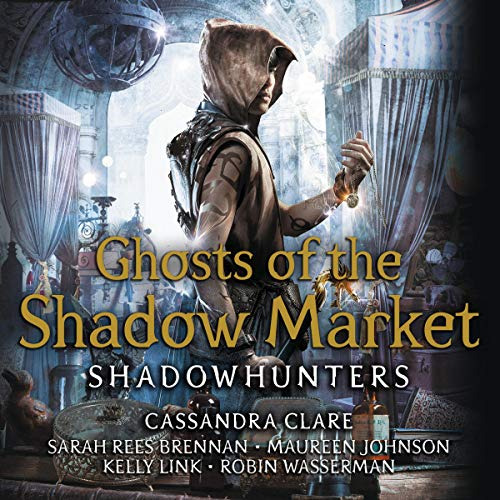
2. Ghosts of the Shadow Market by Cassandra Clare, Sarah Rees Brennan, Maureen Johnson, Kelly Link, and Robin Wasserman
Honestly, I wasn’t going to read this Shadowhunters novella bind-up. I haven’t read any of the other bind-ups. I only actually decided to read it because I was running out of audiobooks I wanted to listen to, and this was the only Shadowhunters bind-up on Audible. But I’m so glad I did.
So this novella bind-up is set in the world of the Shadowhunters and basically follows Jem Carstairs from the end of the Infernal Devices, up to its epilogue and then beyond. It was released after the Mortal Instruments, the Infernal Devices and the Dark Artifices, but before the Last Hours, the Eldest Curses and the Wicked Powers (obviously, because the Wicked Powers doesn’t even have a title for book one yet). The earlier novellas set up the Last Hours, the later ones the Wicked Powers, and probably the Eldest Curses, too, but I don’t really remember.
I didn’t enjoy the Mortal Instruments, and after reading City of Bones, I listened to the rest as audiobooks so I could read the other series, which I did love (even if I felt the Dark Artifices was unnecessarily long). Chain of Gold, the first book in the Last Hours has been out for just over a year now, and has definitely been the most hyped Shadowhunters book in the recent years, so I can’t wait to get to it, and am so glad I read this and got to know a little about the characters, though I don’t think you need to have read this to read Chain of Gold.
Rating: 4.3 stars. (Yes, apparently I’m doing decimals other than .5 now).
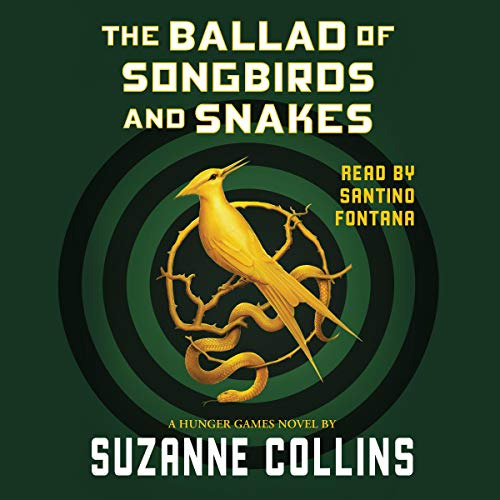
3. The Ballad of Songbirds and Snakes by Suzanne Collins
I finished this audiobook on March 19th, which says something about how my reading’s going this month. Actually, this is the fourth book I read in March 2021, because I also listened to the Mockingjay audiobook this month in my preparation to read this, but I didn’t think it was necessary to include it in this list because I’ve read it so many times before. Four books in twenty days isn’t bad--it’s more than most people read, but still. Especially when three of the four are audiobooks.
So, this book follows Coriolanus Snow, Panem’s president in the original series, as he acts as a mentor in the 10th Hunger Games. These Games are very different to the 74th we see in The Hunger Games, and every character in this book (minus the one character under the age of ten) was alive during the war. Since there have obviously only been nine Games before now, the tributes obviously couldn’t have victors from their districts as mentors the way Katniss and Peeta do, and this is the first year they have any form of mentoring. There’s no training, watching isn’t mandatory, this is the first Games in which they have sponsorships etc. Coriolanus is assigned the female tribute from district 12, and finds himself questioning his morality.
I really wasn’t sure what the point of this book was. It showed more inequality within the Capitol than what the trilogy exposed us to, but it didn’t seem to contain the same message as the Hunger Games, partly because Coriolanus essentially had a negative character arc, so as to become the tyrant, and partly because we knew how it would end. (Spoiler: Coriolanus falls in love with his tribute, but we knew it couldn’t work out because he couldn’t and wouldn’t marry someone from the districts, but he had a wife and daughter in the trilogy.) I don’t understand why Collins is trying to get us to sympathise with this villain--I love sympathetic villains, and anti-heroes, morally grey characters etc., but Snow just isn’t that in the trilogy, so it has little impact.
Granted, I did find the insight to his mind interesting, and the book was very entertaining--and had an excellent narrator--but I just didn’t see the point. I think this had the potential to garner five stars from me, but it just adds so little to the original story, I can’t do it.
(Leena Norms on YouTube made an excellent spoiler review on this book that goes much more in-depth about symbolism, themes etc. You can find it here)
Rating: 4 stars.
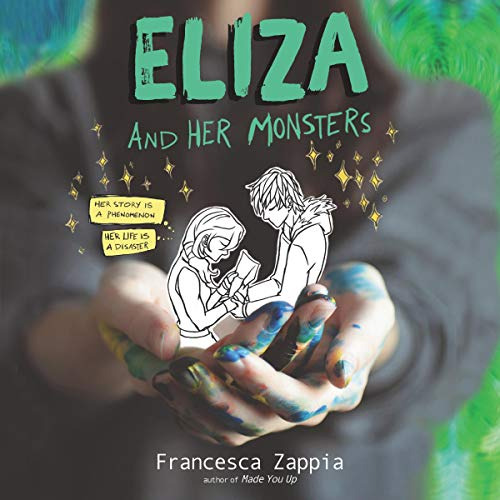
4. Eliza and Her Monsters by Francesca Zappia
I read this in three days. I’m not a huge contemporary person, but hell yes. This book? Mwah.
We follow Eliza Mirk, your typical teenage outsider. She hates high school, and is just waiting for graduation. Online, however, she’s LadyConstellation, the anonymous creator of the hugely popular web comic Monstrous Sea. Then she meets Wallace Warland, a Monstrous Sea fan who Eliza soon discovers is actually RainMaker, the most popular Monstrous Sea fanfiction writer. We have romance, we have geeky stuff, we have relatable hatred of school.
I listened to the audiobook (a running theme of audiobooks here, because I was currently very slowly reading House of Earth and Blood by Sarah J Maas, which is 800 pages. If your book’s going to be more than 600 pages, make it two books. Please.), which was a little disappointing because I later found out the book has Monstrous Sea comic strips in it, which are in the audiobook, you just don’t get the visuals. Regardless, the narrators were excellent, and I loved this as my intro to the contemporary genre.
Rating: 4 stars.
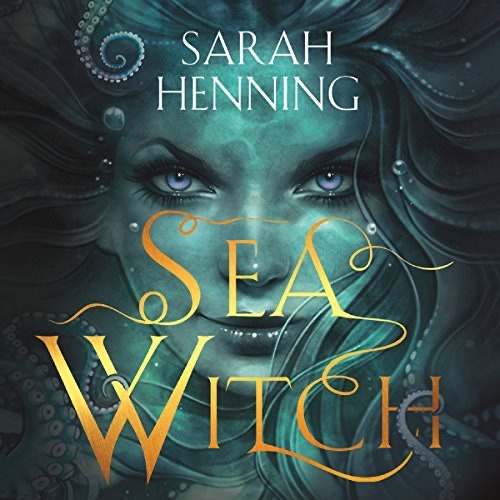
5. Sea Witch by Sarah Henning
This was the last book on my audiobook list before I gained a ton more, and though it wasn’t mind-blowing, it was enjoyable, and I do want to read the sequel. Or rather, listen to it.
This book takes place before the game of the Little Mermaid, and follows a young woman who will become the Sea Witch. One day, a girl drowns as her friends fail to save her. Three years later, a girl with nearly the same name arrives in her friends’ lives, though no-one but Evie recognises her, and Evie must help her get the prince to give her true love’s kiss to save her.
The plot wasn’t especially exciting and the characters weren’t especially interesting; the plot was rather predictable, but the writing was excellent and it was enjoyable nonetheless.
I’m curious as to where the sequel will go, because this book’s epilogue is set 50 years after the climax, but I assume it’ll be the retelling of the actual Little Mermaid story.
Rating: 3 stars.
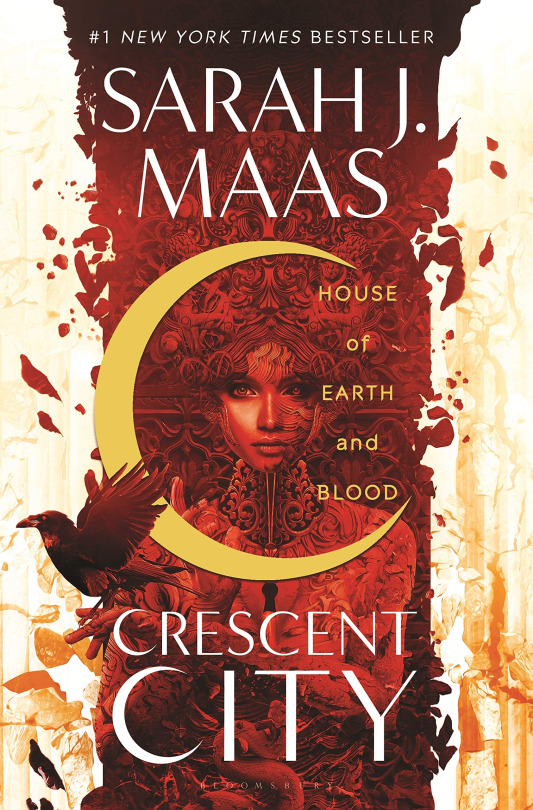
6. House of Earth and Blood by Sarah J Maas
I didn’t want to love this book as much as bookstagram does. In fact, over time, my love for Maas’s Throne of Glass and A Court of Thorns and Roses has faded, especially earlier this year when I listened to the Throne of Glass audiobooks (my second read through), and was struggling by the end, because it took itself way too seriously, and it felt like it was just continuing for the sake of it (I stand that the entire eight-book series could have been four or five books at most, and that’s including the prequel). In contrast, this just didn’t drag. I was intiially overwhelmed by the 800 pages, but, God, it was worth it.
The Crescent City series is set in a modern-day fantasy, with modern technology, but where humans, angels, shifters, fae, and a thousand other kinds of supernatural creatures, live side by side. Bryce Quinlan is half-fae, a party girl, living like tomorrow doesn’t exist, until her best friend, and her best friend’s wolf pack, are murdered. Two years later, a similar string of murders starts up again, though the supposed killer remains imprisoned, and Bryce is recruited by the city government to investigate, with the help of Hunt Athalar, an enslaved fallen angel, who Bryce is incredibly thirsty for.
I made notes while reading this. I had many thoughts, throughout 800 pages.
Maas just really wants to write kind-of-fae protagonists: every one of her books (bar Catwoman: Soulstealer) has a protagonist who isn’t always entirely human, and who isn’t always entirely fae.
It felt like this was only classed as adult instead of young adult so she could use the word ‘fuck’ three times per page--her previous books being young adult didn’t stop her writing graphic smut scenes.
In the first three hundred pages, the main cast walked into the road and halted traffic so many times (being like twice)--Jesus, can we just let the poor drivers be?
This book never really explains the Gods in this world. There’s so much lore, and worldbuilding, but the Gods are never really explained.
Lehabah’s character reminded me so much of Iko from The Lunar Chronicles by Marissa Meyer, and I am so here for it.
‘...Bryce mused, toying with her toes. They were painted a deep ruby. Ridiculous, he told himself. Not the alternative. The one that had him imagining tasting each and every one of those toes before slowly working his way up those sleek, bare legs of hers.’ Right, so the Umbra Mortis has a foot fetish.
Looking back through my notes, I made this one--’I get that it’s more fun to write attractive characters, but not every no-name needs to be drop dead gorgeous’--which is hilarious to look back on because the character I was specifically referencing turned out to be a very big name, but still.
I did enjoy every second of this book, but I still think it could have been condensed. God only knows how many words were in the first draft of this book.
A lot of the words for things in this--Midgard for Earth/the mortal world; Vanir for the supernatural creatures--are from Norse mythology, and I’m so here for it.
By the time the actual truth of the mystery came out, I’d already been given so many assumptions and alternatives as to what happened, that, having finished the book, I can barely remember the actual truth. We were given at least four versions of the story.
Finally, Bryce and Hunt spend literally this entire book lusting after each other, and we hear about their fantasies about each other at least twenty times, but they literally never have actual, penetrative sex. There are explicit scenes, sure, but the most action for himself Hunt gets is alone in the shower.
Anyway, I loved this. It was 1000% better than previous books by Maas, and I want book two immediately. (Maybe not immediately; I’d like to read other books, but still.) I finished it on March 31st, and it was my 30th read of the year, actually completing my Goodreads goal for the year--it was intentionally low because I only read 23 books last year, but in the shortest quarter of this year, I already met my goal. I’m leaving the Goodreads official goal at 30, because I don’t want to push myself too far, but I have a silent goal of 100--if I keep up this pace, I can read about 122 books, but we’re going to keep quiet, because I sincerely doubt I’ll manage that.
Rating: 5 stars.
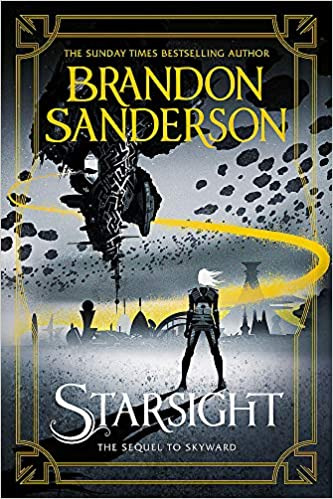
7. Starsight by Brandon Sanderson
God, this surpassed Skyward. I think part of that is because I already knew a lot of the characters, and Spensa is significantly less annoying in this one. It follows an incredibly different storyline to the first, but still has the same vibes, and was, frankly, a fantastic sequel.
I will say this series reads very young, and it’s very difficult for me to imagine the characters as adults.
Also, called the romance, and they kiss in this one, and it’s actually very anticlimactic. The two characters are in completely different places for most of this book, so there’s not much development, but my God.
This book, this world... ahhhhh. If you don’t like science fiction, you won’t like this series, but otherwise, just read it. You won’t regret it.
Rating: 4 stars.
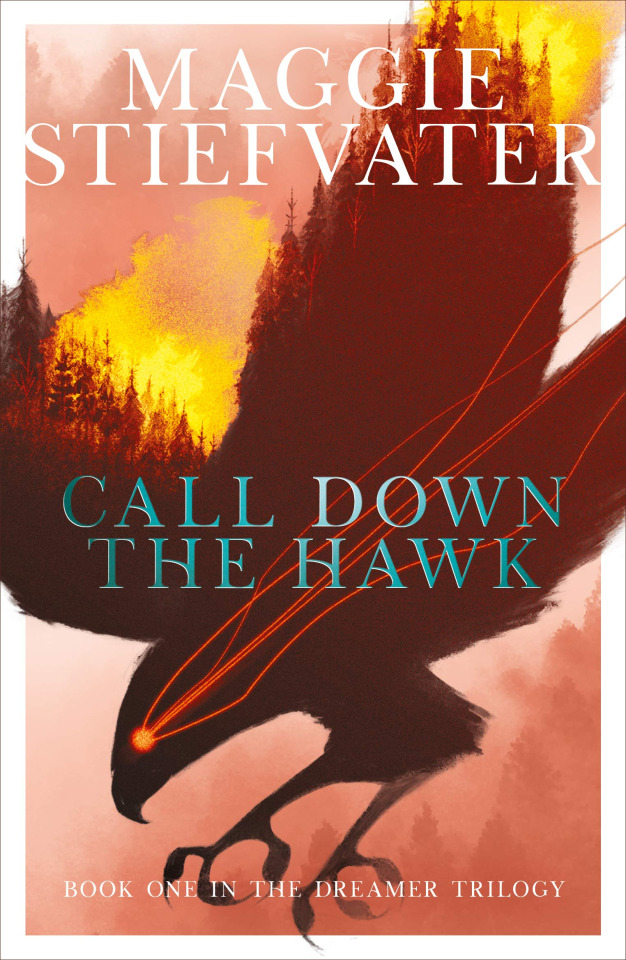
8. Call Down the Hawk by Maggie Stiefvater
First off, I love the US cover for this, but the UK one is so much better, and you can fight me on that.
This is the first book in the Dreamer Trilogy, a sequel series to The Raven Cycle, centred on the wonderful Ronan Lynch. The existence of this book was actually why I decided to reread The Raven Cycle--I listened to the audiobooks in, I think, 2018, and didn’t pay a huge amount of attention, which was, in retrospect, a horrible idea, given how complicated the storyline is, but I wanted to read this series, so a reread was required. And, as we know, I’m so glad I did, because I absolutely fell in love.
I do wish this book had more of the other Raven Cycle characters--you’ve obviously got Ronan and his brothers, and Opal, but there was so little Blue, Gansey and Adam. Adam was actually in quite a few scenes, but he’s my least favourite of the main four; Gansey had some texts and Blue had a single phone call, except that chapter was from Declan’s perspective, so we only got Ronan’s end.
Regardless, Stiefvater, as usual, introduced some amazing new characters, more worldbuilding, and I love the way she gives the antagonists’ perspective, too. There’s about a month, as of today, before the sequel comes out, and, fair to say, I can’t wait.
Rating: 4.2 stars.
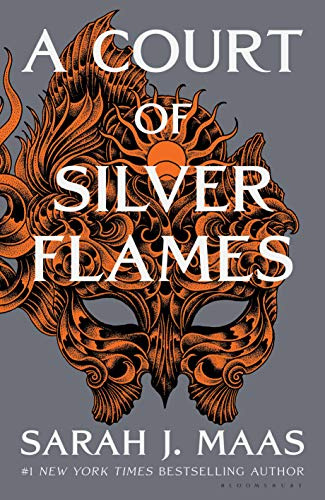
9. A Court of Silver Flames by Sarah J Maas
I hate this cover change. Utterly inferior to the original covers.
In all honesty, my love for SJM has faded over the last few months--though I do now think House of Earth and Blood may have revived it--but I did still enjoy this. So now let’s go through the notes I made as I went!
First off, though, this is the fourth book in the A Court of Thorns and Roses series, focusing on Nesta and Cassian, but I’m not saying anything else so as to avoid spoiling the first three.
The opening reads like fanfiction. The introductions, the inciting incident--I’ve never been a huge fanfic reader, but this reads like fanfic setup.
SJM’s apparently going on a Norse mythology surge, what with Vanir in Crescent City and Valkyries here, but I’m really, really here for it
Elain Archeron feels irrelevant. She has imapct on Feyre and Nesta, sure, but she has no agency of her own. People ship her with Azriel, solely because she’s the unmated Archeron sister; he’s the unmated bat boy, but I’m not sure how I feel about that.
I sincerely hope we get more context as to Amren’s origins. There was a little in this, but not enough to satisfy me.
SJM has an obsession with masculinity. Little to a fault, honestly--every one of her male characters in described in some way, shape or form as the epitome of masculinity and ‘male arrogance’, and it irritates me to no end. Honestly, her books all feel like vessels for a sub/dom kink. Just saying.
‘As if she’d been freed from a cage she hasn’t realised she’d been in.’ I didn’t make note of it, but she this was the second time Sarah tried to test whether or not we’d notice this blatant manipulation of the ‘breath they didn’t realise they were holding’ cliche.
Stop capitalising the word ‘Made.’ It’s really not that difficult, and it’s ugly.
And as for the 70% of this book that is purely smut: hate that Nesta’s scent was disguised because Cassian’s ‘essence’ was all over her. What does that mean and why does even her scent submit to him??
Literally all of her female characters fall into the minority of women capable of orgasm from purely penetrative sex: it’s unrealistic, and I’m not entirely convinced SJM understands how the female body works. Also, in both this and Crescent City, she kept saying ‘her breasts pebbled’, and I still have no idea what that means.
I did, however, really enjoy seeing the Winter Solstice celebrations again.
I enjoy the smutty scenes as much as the next reader, but the latter fifth of this book, when they finally stopped shagging and got on with the plot, were so much better than the earlier ones.
Regardless, I did really enjoy this book, and come out with a hugely positive opinion, mostly because I enjoyed the last hundred pages so much.
Rating: 4.1 stars.
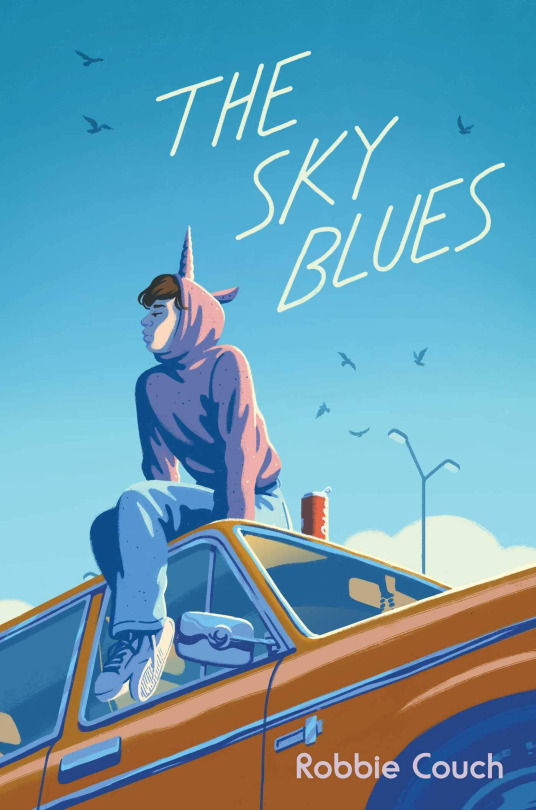
10. The Sky Blues by Robbie Couch
I cannot get Robbie Couch’s name right. I keep thinking it’s Crouch, and I don’t know why. Anyway.
This was the Booksplosion book of the month for April, and is very much not my typical thing. I am, however, trying to branch out my reading from purely fantasy and sci-fi, so here we are.
This book follows Sky Baker, an openly gay high school senior in Michigan, who is planning a promposal for his crush. Who may or may not be straight. Then, his promposal plans are exposed to the school in a homophobic, racist email-blast. That’s basically it, which doesn’t seem to me like a lot, but then most books I read aren’t 300-page standalones.
The narrative is a little cliche. We get an appearance-by-mirror on page four, which didn’t exactly give me much faith. There were, of course, also the times Couch pretended he wasn’t using the let-out-a-breath-they-didn’t-realise-they-were-holding cliche: ‘took a burden off my shoulders I hadn’t even realised was weighing me down.;’ ‘a million pounds I hadn’t even realised had been weighing me down for days.’ A nice metaphor, but cliche nonetheless.
It contains so many pop culture references, which are really entertaining in 2021, but will probably really date this in a few years.
Also, minor spoiler: we didn’t even get to see the actual prom. There was the whole build-up to it, the month before, the weeks before, the day before, and we never even got satisfaction.
Regardless, this was an easy, wholesome read, and I think it’ll be a good part of my entry to the world of contemporary.
Rating: 4.1 stars.
And those are my recent reads.
#blog#blogging#blog post#blogpost#blogger#bookblogger#bookblr#reading#ya#reader#ya books#young adult#wrap up#tbr#reading wrap up#writer#writing#writerblr
1 note
·
View note
Text
Another TMI movie rant, WHY ARE JACE, ALEC AND IZZY ALL BRITISH?!?!? Even with the main Shadowhunters base is in Europe, Robert and Maryse were cast out, Alec wasn't even born yet!!! Jace didn't even have an accent mentioned in the books 😭. Unless all three actors couldn't do an American accent for jackshit I don't understand it
#anti the mortal instruments#anti the mortal instruments city of bones movie#jace wayland#alec lightwood#izzy lightwood
19 notes
·
View notes
Text
The men’s haircuts in the tmi adaptations actually fill me with rage btw. Like it’s unnatural how angry they make me.
#except for movie jace obviously he’s alright#and movie simon#city of bones#anti shadowhunters#the mortal instruments#city of bones movie#alec lightwood#raphael santiago#jace herondale
19 notes
·
View notes
Text
To the TMI stans in my inbox saying Alec didn't choke Clary, he fucking did. He grabbed her throat and shoved her against the wall, after leaving she grabbed at her throat and took quick breaths, he choked her
#anti the mortal instruments city of bones movie#anti movie alec lightwood#fuck movie alec all my homies hate movie alec
7 notes
·
View notes
Text
Jamie Campbell Bower will always be MY Jace Wayland Lightwood Herondale ❤️
Nothing but respect for MY Jace Herondale who is played by an unproblematic beautiful talented angel.

#the better man the right man#tmi#the mortal instruments#shadowhunters#city of bones#jace herondale#tmi movie#jace wayland#jonathan herondale#jamie campbell bower#jamie bower#anti dom sherwood#movie!jace#dom is over party#jace lightwood#moviejaceisbetter
2K notes
·
View notes